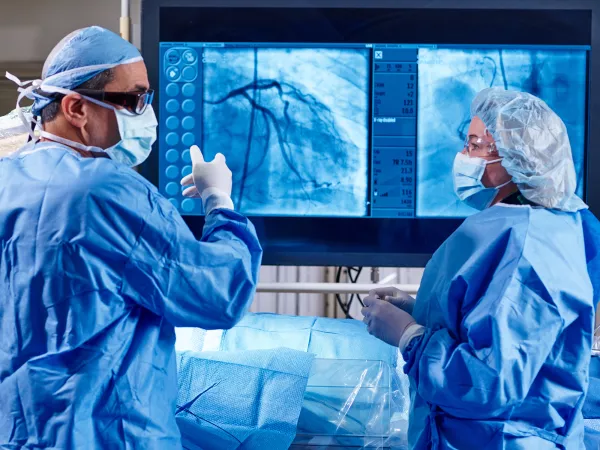Choosing the right Cardiologist near me: A patient’s guide to local heart experts
Choosing the right Cardiologist near me: A patient’s guide to local heart experts
Blog Article
Comprehending the Relevance of Cardiology in Modern Medical Care Solutions
Cardiology plays a critical role in modern-day healthcare, especially as heart problem remains to be the leading reason of mortality worldwide. Breakthroughs in diagnostics and treatment have actually changed client care, enabling earlier treatments and improved outcomes. The shift towards preventive cardiology equips individuals to manage their wellness proactively. As modern technology continues to develop, the assimilation of ingenious options may further redefine cardiology's effect on public health and wellness, motivating a closer examination of emerging trends and their effects.
The Occurrence of Heart Problem and Its Effect On Public Wellness
Although cardiovascular disease stays the leading cause of fatality worldwide, its impact extends far beyond specific people to influence public health systems and economies. The high frequency of heart illness positions a substantial stress on health care resources, requiring enhanced financing for recovery, avoidance, and treatment programs. Public wellness initiatives should address threat factors such as obesity, cigarette smoking, and sedentary way of lives, which contribute significantly to the rising incidence of heart conditions.Moreover, the financial problem related to heart disease is tremendous, including not just direct clinical prices but also indirect costs connected to shed performance and premature death. Neighborhoods deal with challenges in taking care of these costs, commonly causing disparities in healthcare access and outcomes. As the population ages and lifestyle-related threats continue to escalate, the urgency for reliable cardiology treatments becomes critical. Consequently, addressing cardiovascular disease is not only a matter of individual health and wellness yet additionally an essential public health and wellness top priority.
Advances in Cardiac Diagnostics and Imaging Techniques
Current developments in cardiac diagnostics and imaging methods have actually transformed the area of cardiology, improving the capacity to detect and monitor cardiovascular disease. Techniques such as cardiac MRI, CT angiography, and echocardiography have actually become significantly innovative, supplying in-depth pictures of cardiac frameworks and features. These methods permit the early identification of problems like coronary artery illness, heart failure, and valvular disorders.Moreover, developments in non-invasive diagnostics, such as wearable technology and remote monitoring gadgets, have equipped people and healthcare companies. These tools facilitate real-time monitoring of heart rhythms and various other important indicators, bring about prompt interventions. Additionally, expert system is being integrated into imaging evaluation, improving accuracy and efficiency in diagnosis.
Advancements in Treatment Options for Heart Conditions
Current improvements in cardiology have actually led to substantial innovations in treatment options for heart disease. These consist of advanced medical strategies that enhance procedural end results and arising drugs that offer new methods for therapy. As the field evolves, these technologies play an essential duty in enhancing individual treatment and outcomes.
Advanced Surgical Techniques
Innovations in surgical techniques have transformed the landscape of cardiology, supplying new hope for clients with heart problems. Minimally intrusive procedures, such as catheter-based interventions, have greatly lowered recovery times and health center keeps. Strategies like robotic-assisted surgical treatment enhance precision, enabling specialists to browse complicated physiological structures with higher accuracy. Furthermore, advancements in imaging technology facilitate real-time visualization throughout procedures, boosting results. Transcatheter aortic shutoff replacement (TAVR) exemplifies an advancement in dealing with aortic constriction, enabling shutoff replacement without open-heart surgical treatment. In addition, hybrid methods that combine catheter-based and surgical approaches give tailored services for different cardiac problems. These advanced medical techniques not only boost individual safety yet also increase treatment choices, highlighting the essential role of development in modern cardiology methods.
Emerging Treatments and medicines
As the landscape of cardiology remains to advance, arising therapies and medicines play an essential role in improving treatment alternatives for heart conditions. Innovations such as unique anticoagulants and advanced lipid-lowering agents have changed the monitoring of cardio illness, considerably reducing individual morbidity and death. Furthermore, the advancement of genetics therapies and regenerative medication provides promising methods for treating problems previously deemed permanent. Medical trials are continually exposing the efficiency of these therapies, pushing the boundaries of typical therapies. Additionally, the integration of electronic health and wellness innovations assists in personalized medicine, enabling tailored treatment strategies based on hereditary and lifestyle variables. Collectively, these innovations highlight the vibrant nature of cardiology, improving client results and redefining criteria of care in modern health care.
The Role of Preventive Cardiology in Individual Treatment
Precautionary cardiology plays an important role in individual treatment by focusing on the identification of danger factors that add to cardiovascular disease. Via way of life alteration strategies and very early discovery strategies, doctor can successfully reduce the occurrence of cardiovascular occasions - Dr Garcia. This aggressive strategy not only improves person end results but likewise promotes long-term health
Threat Variable Recognition
While heart diseases stay a leading reason of morbidity and death worldwide, reliable danger aspect recognition works as a cornerstone of preventive cardiology. Recognizing danger variables such as high blood pressure, family members, diabetes, and hyperlipidemia background is important for very early treatment. Medical care professionals utilize numerous evaluating techniques to examine these factors, permitting tailored safety nets. Furthermore, comprehending an individual's lifestyle options, such as smoking and physical inactivity, even more notifies risk assessments. This detailed examination allows medical professionals to establish individualized care plans focused on mitigating threats. By prioritizing threat aspect identification, healthcare systems can enhance patient end results and lower the overall worry of heart diseases, ultimately contributing to enhanced public health strategies and resource allowance.
Lifestyle Alteration Methods
A multitude of studies highlights the important role of way of living adjustment techniques in lowering heart disease risk. These strategies include nutritional adjustments, increased exercise, smoking cigarettes cessation, and weight monitoring. By embracing a heart-healthy diet abundant in check over here fruits, vegetables, entire grains, and lean healthy proteins, individuals can reduce cholesterol degrees and blood stress. Routine exercise enhances the heart and boosts overall cardiovascular health. Additionally, giving up cigarette smoking significantly minimizes the risk of cardiovascular disease and boosts recovery prices for those with status quo. Weight monitoring better adds to cardio wellness by minimizing various other risk variables such as diabetes mellitus and high blood pressure. Executing these way of living alters not only promotes private health yet also acts as a cornerstone of preventive cardiology in patient treatment.
Early Detection Strategies
Lifestyle modifications greatly contribute to reducing cardiovascular disease dangers, however they are most efficient when coupled with early detection methods. Preventive cardiology emphasizes the value of identifying possible heart concerns before they rise right into significant problems. Strategies such as blood stress tracking, cholesterol screening, and advanced imaging technologies like echocardiograms play essential roles in reviewing cardiovascular health and wellness. Biomarkers and genetic testing additionally enhance the accuracy of early detection, permitting tailored preventive strategies. Normal cardiac threat examinations encourage health care carriers to intervene proactively, possibly avoiding cardiovascular disease and strokes (Cardiology). By incorporating these early discovery methods right into regular care, people can benefit from timely way of life treatments and targeted treatments, ultimately from this source boosting end results and boosting top quality of life
Integrating Innovation Into Cardiology Practices
As advancements in modern technology remain to reshape various areas, the assimilation of innovative tools and systems into cardiology techniques has actually come to be essential for boosting patient care and results. Telemedicine systems allow cardiologists to monitor patients remotely, boosting accessibility to care while decreasing the burden on medical care facilities. Wearable gadgets, such as smartwatches, make it possible for continuous heart rate monitoring, signaling both physicians and individuals to potential concerns in real-time. Furthermore, expert system (AI) is being made use of to analyze substantial amounts of cardiac information, aiding in very early diagnosis and individualized treatment plans. Advanced imaging methods, including 3D echocardiography, improve visualization of heart structures, leading to extra accurate interventions. Electronic wellness records (EHRs) enhance patient details administration, ensuring that cardiologists have instant accessibility to important information. Together, these technical developments are changing cardiology, promoting aggressive administration and improved wellness outcomes for individuals with cardiovascular conditions.
The Importance of Client Education And Learning and Interaction
Patient education and interaction play a critical duty in the administration of cardio wellness. By equipping patients with expertise regarding their problems, therapy choices, and way of life changes, health care suppliers encourage people to take an active function in their treatment. This positive approach can cause boosted adherence to prescribed medicines, dietary modifications, and exercise regimens, ultimately lowering the danger of complications.Engagement also fosters a strong patient-provider connection, motivating open communication and trust. When people really feel educated and included, they are most likely to voice problems and ask questions, which can bring about better professional end results. Furthermore, instructional sources, such as workshops or electronic systems, can improve understanding and advertise self-management methods. Generally, focusing on patient education and learning and engagement is important for enhancing cardiovascular health and wellness, enhancing top quality of life, and minimizing healthcare expenses linked with heart diseases.
Future Fads in Cardiology and Their Possible Influence

Often Asked Concerns
What Way Of Life Modifications Can Lower Cardiovascular Disease Danger?
The present inquiry addresses lifestyle adjustments that can significantly reduce heart disease danger. Dr Garcia. Taking on a well balanced diet regimen, taking part in routine exercise, preserving a healthy and balanced weight, handling tension, and preventing cigarette can significantly boost cardio health
How Can I Recognize Very Early Indicators of Heart Issues?
Recognizing very early indications of heart troubles involves monitoring signs such as breast pain, lack of breath, fatigue, and irregular heartbeat. Timely awareness of these indicators can trigger needed medical evaluation and intervention for far better results.
What Are the Distinctions Between Cardiologists and Heart Surgeons?
The differences between cardiologists and heart surgeons depend on their roles; cardiologists primarily diagnose and handle heart disease through non-invasive techniques, while heart doctors carry out operations to remedy architectural heart concerns. Each plays an important, distinct role.

Exactly how Frequently Should I Get My Heart Health And Wellness Checked?
The regularity of heart checkup varies based upon private threat variables. Normally, grownups need to undergo evaluations every one to two years, while those with status quo might call for more regular evaluations as recommended by health care professionals.
What Role Does Genes Play in Cardiovascular Disease Threat?
Genes substantially affects heart problem threat, with familial patterns suggesting acquired conditions. Specific genetics can predispose individuals to hypertension, cholesterol problems, and other cardiovascular troubles, highlighting the value of genetic testing in evaluating heart health. Heart illness continues to be the leading cause of fatality internationally, its impact extends much beyond individual patients to affect public health systems and economies. Public health and wellness initiatives have to deal with threat aspects such as obesity, smoking, and inactive lifestyles, which add significantly to the rising incidence of heart conditions.Moreover, the financial concern associated with heart disease is tremendous, incorporating not only Resources straight medical prices however additionally indirect expenses related to shed productivity and premature death. Preventative cardiology plays a necessary role in individual care by concentrating on the recognition of risk aspects that contribute to heart illness. Artificial knowledge (AI) and equipment knowing are enhancing diagnostics and individual monitoring, making it possible for early detection of heart illness. The differences in between cardiologists and cardiac doctors exist in their functions; cardiologists primarily diagnose and handle heart conditions through non-invasive methods, while cardiac specialists carry out medical procedures to deal with structural heart concerns.
Report this page